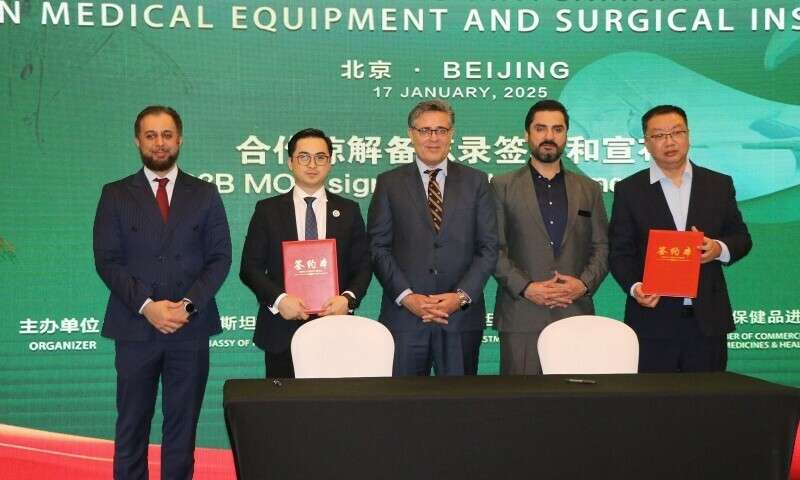In a significant development for the Pakistani medical sector, companies from Pakistan and China have signed a series of memorandums of understanding (MoUs) valued at approximately $250 million. These agreements aim to bolster cooperation between the two countries in the medical and surgical equipment trade. This partnership is poised to enhance Pakistan’s capabilities in the medical sector, contributing to the country’s growing healthcare industry.
The MoUs were signed during a special China-Pakistan B2B matchmaking conference held in Beijing, which focused on medical equipment and surgical instruments. The conference was a part of an ongoing effort to strengthen economic ties between China and Pakistan, as both nations work to enhance trade relations and investments in various sectors, including healthcare.
Overview of the China-Pakistan Economic Partnership in Healthcare
Strengthening Bilateral Relations Through Trade
Pakistan and China have long maintained a robust bilateral relationship, one that has been driven by multiple joint ventures, investment projects, and collaborations. A cornerstone of this partnership has been the China-Pakistan Economic Corridor (CPEC), which has been hailed as a “lifeline” for Pakistan’s economic future. Through this corridor, China has provided critical infrastructure and investment support to Pakistan, which has helped stimulate various sectors, including healthcare.
The medical and surgical sectors are emerging as key areas of collaboration, and the $250 million MoUs signed during the Beijing conference mark a significant step forward in this direction. Pakistan’s growing medical industry, valued at over $600 million, offers vast opportunities for foreign investment, particularly from China, which has already established a presence in the region in other sectors.
The Key Players and the MoUs Signed
The Silk Road Assistance Industrial Internet Platform, a China-based provider of advisory services for cross-border businesses, played a pivotal role in facilitating the MoUs signed during the event. The platform worked closely with Pakistani dental and surgical instrument manufacturer Sawuat and Chinese pharmaceutical company UPH Biopharma to formalize the agreements.
According to reports, the collaboration aims to promote the establishment of joint ventures in the medical instrument sector between Chinese and Pakistani companies. This initiative is expected to encourage more Chinese companies to set up operations in Pakistan, further enhancing the country’s capacity to produce high-quality medical products.
The Pakistani embassy in Beijing confirmed the signing of the MoUs and highlighted the importance of this step in fostering stronger trade relations. The embassy also emphasized that the Board of Investment (BOI) had been instrumental in hosting the matchmaking conference and facilitating these important agreements.
Pakistan’s Growing Medical Sector and Its Future Potential
Potential for Growth in Pakistan’s Healthcare Industry
Pakistan’s medical industry is ripe for growth, especially in the fields of surgical instruments, medical devices, and pharmaceuticals. The country has an established manufacturing base for these products, with many local companies already producing a wide range of medical equipment. However, there remains significant room for improvement, especially in areas such as medical technology innovation and international brand recognition.
With China’s expertise in high-tech medical devices and healthcare infrastructure, the collaboration is expected to accelerate the development of advanced technologies in Pakistan’s healthcare sector. This includes improvements in image documentation, medical imaging equipment, and other specialized surgical instruments.
Challenges and Opportunities for Chinese Investment
One of the major opportunities for Chinese companies lies in Pakistan’s vast market, which presents a competitive edge for international investors. The medical device industry in Pakistan continues to expand, and Chinese companies are increasingly keen to enter this market.
Sunny Yang, the Chief Technology Officer of the Silk Road Assistance platform, highlighted Pakistan’s tax incentives and its large labor force as significant attractions for potential Chinese investors. He also pointed out that Pakistan’s medical industry has an advantage due to its compliance with European standards, which is likely to enhance its appeal to global investors.
On the other hand, Chinese companies also bring advanced technology and expertise in manufacturing, which will enable Pakistani companies to scale up production and improve the quality of medical instruments.
The Significance of B2B Conferences and Future Roadshows
The Role of B2B Matchmaking Conferences
The B2B matchmaking conference in Beijing, which saw the signing of the $250 million MoUs, was part of a broader strategy to facilitate investment and trade between China and Pakistan. These events provide a platform for businesses from both countries to meet, discuss potential partnerships, and sign agreements that promote economic collaboration.
The conference featured over 80 Chinese companies and associations and more than 20 Pakistani companies, all of which participated both in person and online. This is a clear indication of the growing interest in healthcare partnerships between the two nations. During the conference, Khalil Hashmi, Pakistan’s Ambassador to China, emphasized the potential of the Pakistani medical industry and announced that Pakistan would host the 4th Health, Engineering, and Minerals Show (HEMS) in Lahore in April 2025. This event will focus specifically on surgical instruments and medical equipment.
Future Roadshows and Continued Investment
The Beijing event marked the conclusion of the first series of seven B2B matchmaking events, which were held following Prime Minister Shehbaz Sharif’s visit to China in June 2024. These events have been successful in promoting investment between the two countries, and another seven roadshows are planned for the coming months.
In September 2024, a separate round of MoUs was signed, during which 25 Chinese companies expressed strong interest in investing in Pakistan. This continued momentum highlights the growing economic ties between China and Pakistan and the strong potential for future collaboration.
Key Insights on the Trade Partnership
China-Pakistan Medical Collaboration: A Win-Win Situation
The collaboration between Pakistan and China in the medical equipment sector is a win-win situation for both countries. While Pakistan stands to benefit from Chinese technology and investment, China gains access to Pakistan’s growing market, abundant raw materials, and the potential for future export opportunities.
Zhou Hui, the Chairman of the China Chamber of Commerce for Import and Export of Medicines and Health Products, emphasized the importance of Pakistan’s large labor force and abundant raw materials in the medical consumables sector. He noted that the demand for high-value medical products in Pakistan is on the rise, making it an attractive destination for Chinese investments.
Building Long-Term Partnerships
As both countries work to establish deeper trade and investment relationships, the long-term goal is to build sustainable partnerships that will benefit both sides. Muhammad Shahbaz, President of the China-Pakistan Medical Association, mentioned that his association is working on establishing a China-Pakistan Friendship Hospital in Islamabad and is planning a joint medical technology park in Pakistan.
These efforts will not only advance medical technology in Pakistan but also create new opportunities for employment and technological innovation in the region.
FAQs About the China-Pakistan Medical Equipment Trade Partnership
1. What is the value of the MoUs signed between Pakistani and Chinese companies?
The MoUs signed during the China-Pakistan B2B matchmaking conference are valued at around $250 million and focus on the medical and surgical equipment sector.
2. What sectors are involved in the agreements?
The agreements involve the medical equipment, surgical instruments, and pharmaceutical sectors, with a focus on joint ventures and the exchange of technologies.
3. What is the significance of the B2B matchmaking conference?
The B2B matchmaking conference serves as a platform for businesses from China and Pakistan to meet, sign agreements, and explore investment opportunities, specifically in the medical sector.
4. How does Pakistan benefit from this partnership with China?
Pakistan benefits from Chinese investment, advanced technology, and the opportunity to improve its medical device production capabilities, leading to enhanced healthcare infrastructure.
5. Are there future plans for collaboration between China and Pakistan in the medical field?
Yes, the partnership is expected to continue with future roadshows, the HEMS show in Lahore, and the establishment of a medical technology park in Pakistan.



